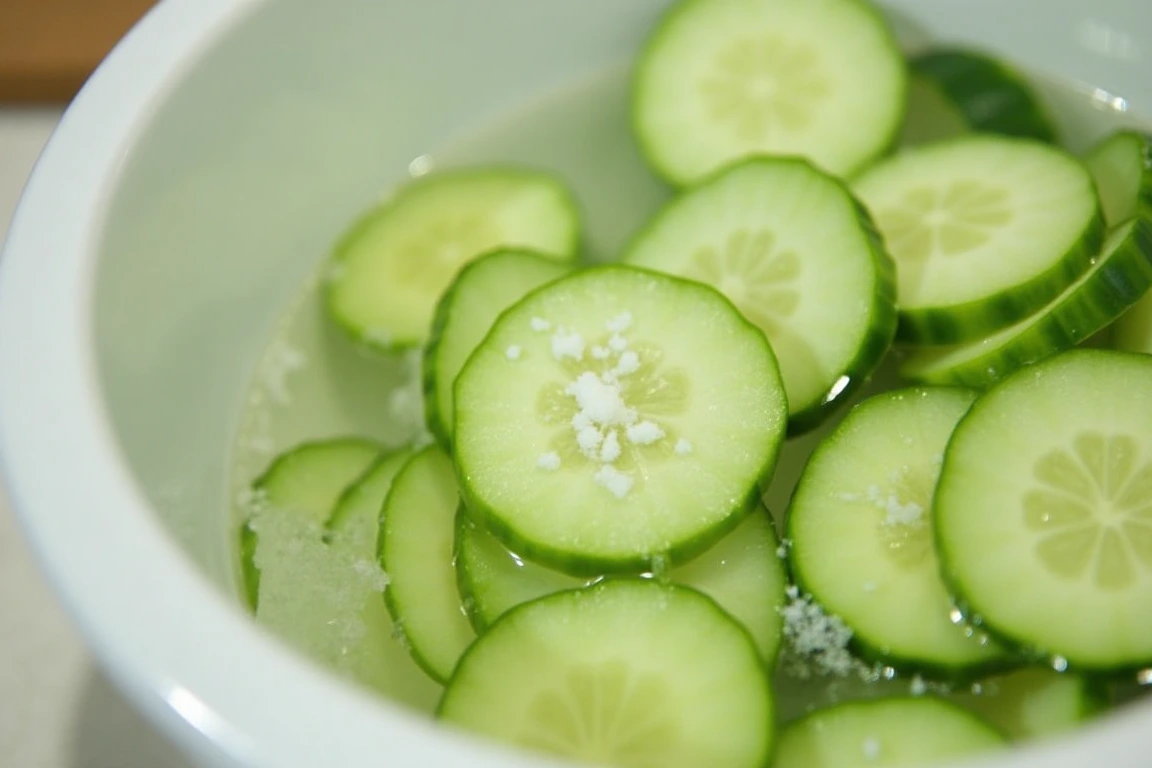Why Soak Cucumbers in Salt Water? Cucumber salads can be a refreshing side dish to many dishes, praised for their crisp texture and a light taste. However, creating an ideal cucumber dish requires more than just chopping or mixing the various ingredients. The most important step in the process of making it is to soak cukes in salted water. This easy and effective method improves the overall taste and texture, creating the stage for a better dining experience.
Why Soak Cucumbers in Salt Water: Enhancing the Flavor and Texture of Salad Ingredients
Saltwater soaking is not just a traditional practice but a scientifically-backed method for improving cucumbers in salad preparation. Cucumbers naturally have a significant water content that is left untreated could dilute the dressing and affect the overall taste balance. By soaking the cucumbers with saltwater, any excess moisture is removed through the process of osmosis. This is not only a way to enhance the flavor of the cucumber, but also keeps this salad from getting too fluid. This results in a pleasant combination of flavors and textures which allows the cucumbers to be more suited to the other ingredients of the dish.
Ditch Dinner Stress — Cook Smart, Not Hard 🍽️
35 quick & budget-friendly 5-ingredient dinners to save your evenings. Simple. Delicious. Ready in 30 minutes or less.
The Benefits of Prepping Cucumbers Before Adding Them to Salad
The process of preparing cucumbers in salt water provides a number of benefits that enhance the taste that your salad. It first enhances the crunchiness of cucumbers, providing the salad with a delicious texture. Additionally, it helps the cucumbers ingest spice and dressings more efficiently and enhances their taste. In addition, this process can reduce bitterness in certain cucumber varieties, creating an even taste. This tiny, but effective step will result in a more satisfying salad that is a delight to the taste.
A Brief Overview of the Cucumber Salad-Making Process
The preparation of a cucumber salad requires the following simple but crucial steps to maximize the flavor and texture of the dish. Begin by picking fresh cucumbers, which should be clean and firm. Peel and cut the cucumbers to the desired thickness. After that, soak them in salty water for about 30 minutes. After the soak, drain them and rub them dry to get rid of any moisture that remains. Mix the cucumbers you have prepared along with other ingredients, such as onions and herbs or tomatoes and top it off with the dressing you prefer. This simple recipe will result in the salad is fresh and flavorful that is an ideal side dish or main course.
Through the use of saltwater in the method of soaking that cucumber salads turn into a tasty and delicious meal that showcases the best of every ingredient.
The Science Behind Soaking Cucumbers in Salt Water
The method of soaking cucumbers in salt water is not just a common kitchen practice and is a scientifically sound process founded on the sciences of chemistry and biology. Through the use of processes such as the osmosis process, this straightforward procedure improves the texture, flavor in general, of the cucumber, which makes them a great ingredient for salads as well as other dishes.
Osmosis: How Salt Draws Out Excess Water from Cucumbers
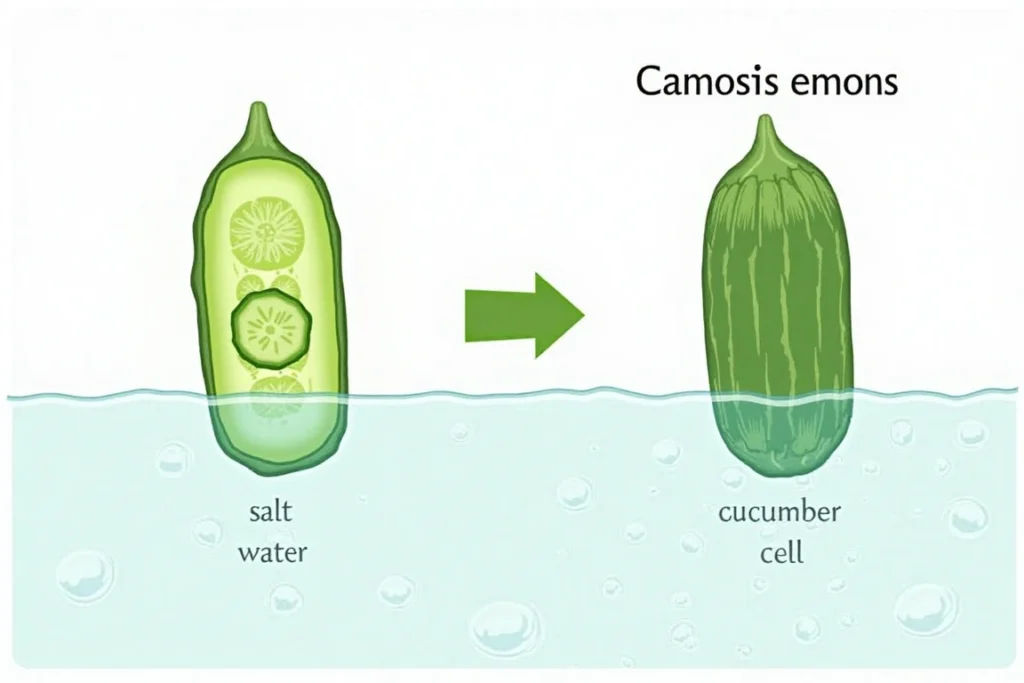
The primary component of the process of soaking saltwater is osmosis, which is a natural process that allows water to move from areas with lower concentration (inside the cucumber cells) to areas with greater solute concentration (the seawater that is outside). When cucumbers are submerged into an saline solution and the excess water inside their cells is drained out which reduces their internal water content. This stops the cucumbers from releasing excessive water into the salad and causing flavors to be diminished and alter the the texture.
The Role of Salt in Improving the Crispness and Texture
Salt does not only help remove excess water, it also helps improve the strength of the cucumber’s structure. Through removing water, salt tightens cell walls, resulting in more firm and crisper texture. This makes sure that cucumbers maintain their crunchiness even when mixed with acidic or moist salad ingredients such as dressings and tomatoes.
How Salt Affects the Natural Taste of Cucumbers
The process of soaking saltwater subtlely alters the taste of cucumbers. The excess water, which could reduce the sweetness of cucumbers and sweetness, is eliminated which allows the flavours to shine. In addition, the salt improves the taste of cucumbers by stimulating taste buds and balances the overall taste of the cucumber.
Reducing the Bitter Taste and Enhancing Freshness
Bitterness may sometimes ruin the freshness of cucumbers, particularly when they are older or less ripe varieties. Cucumbers that are soaked in saltwater is a sure way to combat this problem and ensure a pleasant dining experience.
How Saltwater Helps to Tone Down Overly Bitter Cucumbers
Certain compounds, like cucurbitacins are the reason for the bitter taste of cucumbers. These substances are more soluble when they are in water, which means that taking cucumbers to the saline solution will aid in the elimination of certain bitter ingredients. Salt also neutralizes bitterness and balances the overall flavor and ensuring that cucumbers taste soft and pleasant.
Preserving the Natural Freshness of Cucumbers Through Soaking
The soaking in saltwater not only enhances the texture and taste, but also assists in keeping the freshness of the cucumbers. Through reducing the amount of water in them and stabilizing their shape, they are more likely become soft or wilting rapidly. This process of preservation makes sure that cucumbers keep their freshness and crispness during the preparation process as well as when the dish is served.
Making cucumbers salty is a tiny but transformative step that blends food science with culinary tradition. Through processes like osmosis as well as salt’s unique chemical characteristics, cucumbers get crisper, more flavorful and more fresh, setting the tone for a more enjoyable dining experience.
The Benefits of Soaking Cucumbers in Salt Water for Salad Making
The process of soaking cucumbers in saltwater is a well-known method which enhances the quality of salads made with cucumbers. This simple method improves the texture, flavor and overall quality of the salad, providing an enjoyable eating experience. To get a fascinating comparison of the management of flavors and textures in other recipes, try taking a look at the Purple black bean soup recipe to discover a distinctive way to cook.
Improving the Crispiness and Crunch of Cucumbers
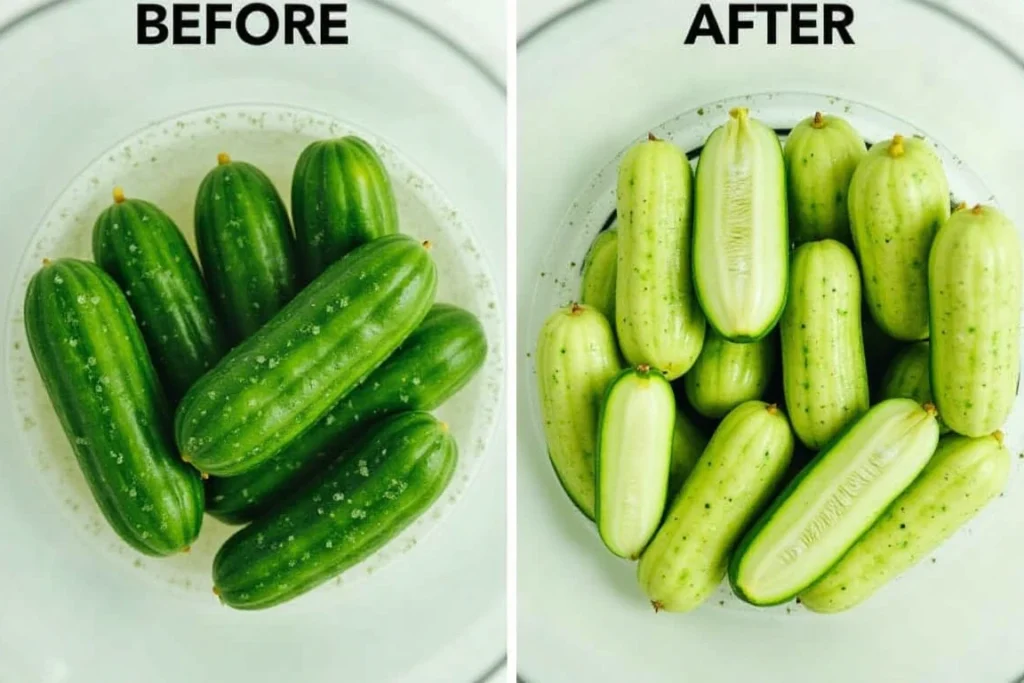
One of the key benefits of soaking cucumbers in salt water is the enhancement of their crispiness and crunch, which is essential for a refreshing salad. If you’re looking for similar insights on enhancing texture, the article What is the Best Way to Tenderize Beef Short Ribs? provides useful tips for meat-based recipes.
Achieving the Ideal Texture for a Refreshing Salad
The saltwater soak helps to draw out excess moisture from the cucumber cells, tightening their structure and creating a firmer texture. This transformation ensures that the cucumbers remain satisfyingly crisp, even after being mixed with other ingredients. The resulting texture adds a refreshing bite to the salad, making it more enjoyable to eat. For another perspective on balancing textures, check out Din Tai Fung Cucumber Salad Recipe.
Reducing Excess Water and Preventing a Watery Salad
Cucumbers are naturally high in water content, which can be problematic in salads, leading to a watery dish that diminishes flavor and presentation. For advice on reducing excess liquid in other recipes, see Do You Need to Soak Black Beans Before Making Soup?.
The Importance of Preventing a Diluted Dressing in the Salad
By soaking cucumbers in salt water, their excess moisture is removed, preventing it from leaking into the salad. This ensures that the dressing retains its intended flavor concentration and consistency. Without the risk of dilution, the salad achieves a balanced and cohesive taste that enhances every bite. If you enjoy learning about preserving flavors, take a look at Remove Bitterness in Black Bean Soup: Tips & Solutions.
Enhancing the Absorption of Flavors from the Dressing
Another significant advantage of saltwater soaking is its role in improving the cucumbers’ ability to absorb and integrate flavors from the dressing.
How Saltwater Prepping Improves Flavor Integration in Salad
The saltwater soak not only enhances the cucumber’s natural taste but also creates a more porous texture, allowing the dressing to cling better to the surface of the slices. This improved absorption ensures that each cucumber slice is infused with the flavors of the dressing and spices, resulting in a harmonious blend of tastes throughout the salad. For more inspiration on flavor integration, see Din Tai Fung Vinegar: What Kind of Vinegar Do They Use?.
How Long Should You Soak Cucumbers in Salt Water for the Best Results?
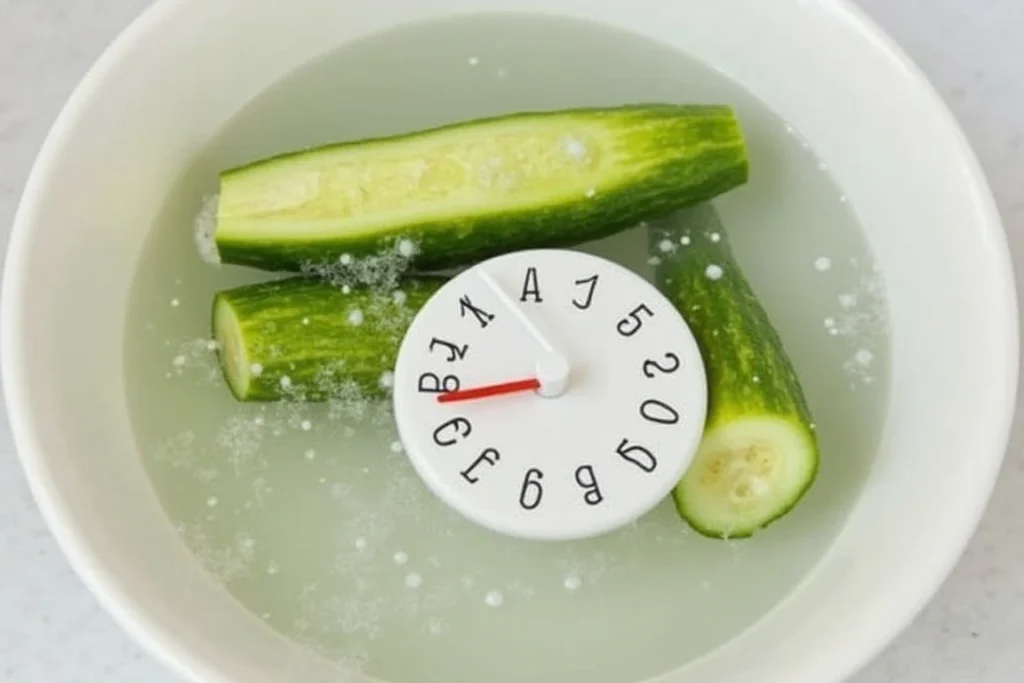
Soaking cucumbers in salt water is a simple yet effective step to enhance their texture and flavor for salads. However, achieving the best results depends on the duration of soaking and the salt-to-water ratio. Here’s a guide to ensure your cucumbers turn out perfect every time.
Recommended Soaking Time for Crisp and Fresh Cucumbers
The ideal soaking time for cucumbers in salt water ranges from 15 to 30 minutes, depending on the desired outcome. A shorter soak of 15 minutes is sufficient for mild texture improvements, while 30 minutes maximizes crispness and flavor enhancement. Soaking beyond this time may cause the cucumbers to lose their natural texture and become overly salty.
How Short or Long Soaking Times Impact Texture and Flavor
- Shorter soaking times (5–10 minutes): These may not be sufficient to remove enough water or significantly improve texture and flavor. However, they can slightly enhance freshness.
- Moderate soaking times (15–30 minutes): This range is optimal for drawing out excess moisture, improving crunchiness, and enhancing natural flavor without overpowering the cucumbers with salt.
- Extended soaking times (over 30 minutes): Excessive soaking can make cucumbers too soft or salty, potentially overshadowing their delicate flavor.
The Right Salt-to-Water Ratio for Effective Soaking
The effectiveness of saltwater soaking also depends on the correct balance of salt and water. A well-measured ratio ensures cucumbers are crisp and flavorful without becoming overly salty.
How Much Salt to Use for Each Cucumber and Water Combination
A common recommendation is to use 1 tablespoon of salt per 2 cups of water for soaking cucumbers. This ratio provides enough salt to draw out excess moisture without overwhelming the cucumbers. For larger quantities, scale the salt proportionally:
- For 4 cups of water: Use 2 tablespoons of salt.
- For 1 cup of water: Use ½ tablespoon of salt.
When preparing a larger batch, adjust the salt concentration based on the number of cucumbers and the volume of water. After soaking, always rinse the cucumbers thoroughly under cold water to remove excess salt, ensuring they are perfectly balanced in flavor.
By following these guidelines for soaking time and salt-to-water ratio, you can achieve crisp, fresh, and flavorful cucumbers that enhance the quality of any salad.
Alternatives to Salt Water for Soaking Cucumbers
While soaking cucumbers in salt water is the most common method for enhancing their texture and flavor, other solutions can provide unique benefits. Vinegar, lemon juice, and sugar water are excellent alternatives for different purposes, particularly when tailoring cucumbers to specific salad styles.
Using Vinegar, Lemon Juice, or Sugar Water as Soaking Alternatives
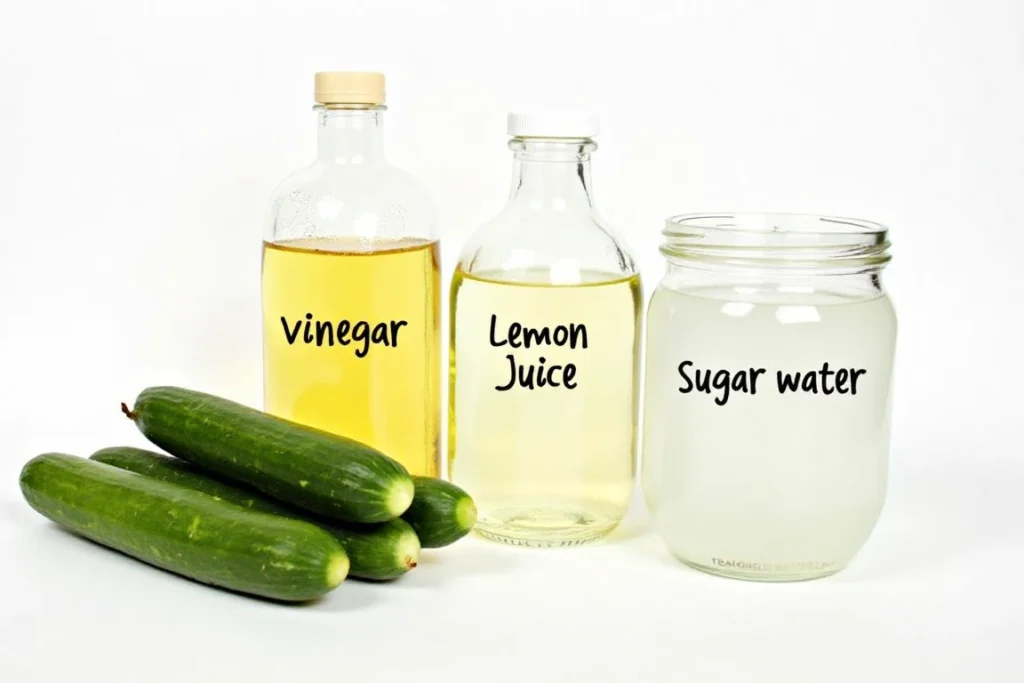
Each soaking alternative brings its distinct advantages to the preparation of cucumbers. Vinegar and lemon juice add tanginess and freshness, while sugar water imparts a touch of sweetness. These methods can be customized based on the salad’s desired flavor profile and accompanying ingredients.
The Benefits of Using Vinegar or Lemon Juice for Added Flavor
- Vinegar Soaks: Soaking cucumbers in vinegar, particularly white or apple cider vinegar, adds a tangy and zesty note. This is ideal for salads with a pickled or sharp flavor profile. Vinegar also helps preserve the cucumbers, keeping them fresh for longer.
- Lemon Juice Soaks: Lemon juice provides a bright and citrusy freshness that complements Mediterranean and summer-style salads. It also balances bitterness while lightly enhancing the cucumbers’ crispness.
To use vinegar or lemon juice as a soak:
- Combine 2 parts water with 1 part vinegar or lemon juice.
- Soak cucumbers for 15–30 minutes.
- Rinse lightly to adjust the intensity of flavor, if necessary.
Sweetened Soaks: When to Use Sugar Water for Cucumbers
Sugar water is an excellent option for adding a subtle sweetness to cucumbers, particularly in salads with fruit or Asian-inspired flavors. This method softens any bitterness and pairs well with ingredients like mangoes, berries, or sesame dressings.
To prepare a sugar water soak:
- Mix 1 teaspoon of sugar with 2 cups of water.
- Soak cucumbers for 10–20 minutes to avoid overly sweetening them.
- Drain and pat the cucumbers dry before using them in your salad.
Soaking for Different Salad Styles: Options for Different Flavor Profiles
Different soaking methods can complement specific salad styles, enhancing the overall culinary experience:
- Tangy and bold salads: Use vinegar or lemon juice to accentuate sharp and bright flavors.
- Sweet and fruity salads: Opt for sugar water to balance sweetness and bitterness.
- Savory and classic salads: Stick to salt water for its versatility in improving texture and maintaining a neutral flavor base.
Experimenting with these alternatives can help create unique and delicious salads tailored to your preferences or the occasion. Whether you prefer a tangy, sweet, or savory approach, alternative soaking methods offer versatility and flavor enhancement that elevates your cucumber salads.
FAQs About Soaking Cucumbers in Salt Water
Soaking cucumbers in salt water is a straightforward technique, but questions often arise about best practices and possible variations. Here are answers to some frequently asked questions to help you perfect your cucumber preparation.
Do I Need to Rinse the Cucumbers After Soaking?
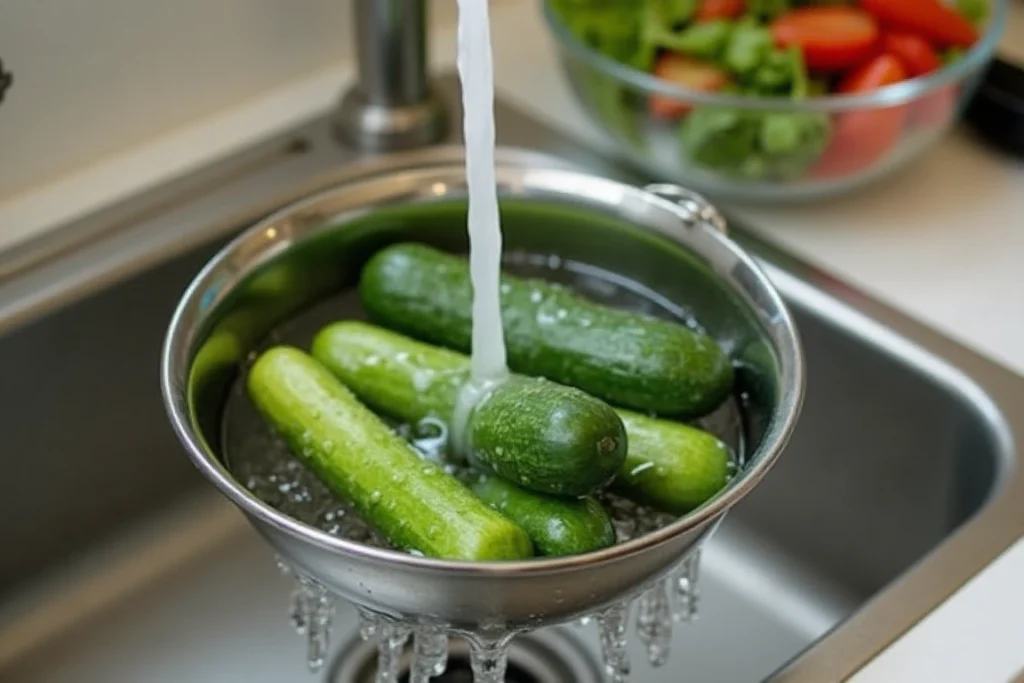
Yes, it is highly recommended to rinse cucumbers after soaking in salt water. Rinsing removes excess salt that could otherwise make the cucumbers too salty and overpower the flavor of your salad. After rinsing, pat them dry with a clean towel to ensure they are ready to absorb the salad dressing properly.
Can I Soak Cucumbers in Salt Water for Longer Than Recommended?
While soaking cucumbers for 15–30 minutes is ideal, extended soaking beyond this time is not recommended. Longer soaking can result in cucumbers becoming overly salty and losing their natural crispness. If you need to prepare cucumbers in advance, rinse and dry them after soaking, then store them in the refrigerator.
Can I Use the Same Salt Water for Multiple Batches of Cucumbers?
Reusing salt water for multiple batches is not advised. Each batch of cucumbers releases water and impurities into the solution, which can dilute the effectiveness of the soak and affect the flavor of subsequent batches. It’s best to prepare a fresh batch of salt water for each soaking to maintain consistent results.
How Do I Know if I’ve Used Too Much Salt in the Soak?
Signs of excessive salt include cucumbers that taste overly salty even after rinsing or a noticeable residue of salt crystals on the cucumber surface. To avoid this, stick to the recommended ratio of 1 tablespoon of salt per 2 cups of water. If you accidentally use too much salt, try soaking the cucumbers in plain water for a few minutes after rinsing to reduce the saltiness.
Can I Skip the Salt Water Soak and Still Have a Great Cucumber Salad?
Yes, you can skip the salt water soak, but the salad may not achieve the same level of quality. Without soaking, cucumbers are more likely to release excess water into the salad, diluting the dressing and potentially softening other ingredients. Skipping this step may also result in less flavor absorption. For the best texture and taste, soaking cucumbers is a valuable and worthwhile step.
Conclusion: The Importance of Soaking Cucumbers for the Perfect Cucumber Salad
Soaking cucumbers in salt water is a simple yet transformative step in creating the perfect cucumber salad. This process enhances the cucumbers’ crispness, improves their texture, and prevents excess water from diluting the salad. It also helps to balance flavors, reduce bitterness, and ensure the dressing integrates seamlessly with the cucumbers. For more tips on achieving well-balanced dishes, you might find Remove Bitterness in Black Bean Soup: Tips & Solutions insightful.
While alternative methods such as vinegar, lemon juice, or sugar water soaks offer additional ways to customize the flavor, salt water remains the go-to solution for maintaining the cucumbers’ natural freshness and crunch. If you’re curious about flavor customization, explore Din Tai Fung Vinegar: What Kind of Vinegar Do They Use? for inspiration.
Skipping this step may save time, but it risks compromising the quality and enjoyment of your salad. Just as soaking cucumbers enhances their crispness, soaking ingredients like black beans can similarly improve texture and flavor, as detailed in Do You Need to Soak Black Beans Before Making Soup?.
By taking the time to soak cucumbers, you set the stage for a salad that is not only visually appealing but also balanced in taste and texture, making it a refreshing and satisfying addition to any meal. Whether preparing a simple side dish or an elaborate culinary creation, the soaking process ensures your cucumber salad consistently reaches its full potential. For more inspiration on crafting perfect recipes, check out Din Tai Fung Cucumber Salad Recipe.
